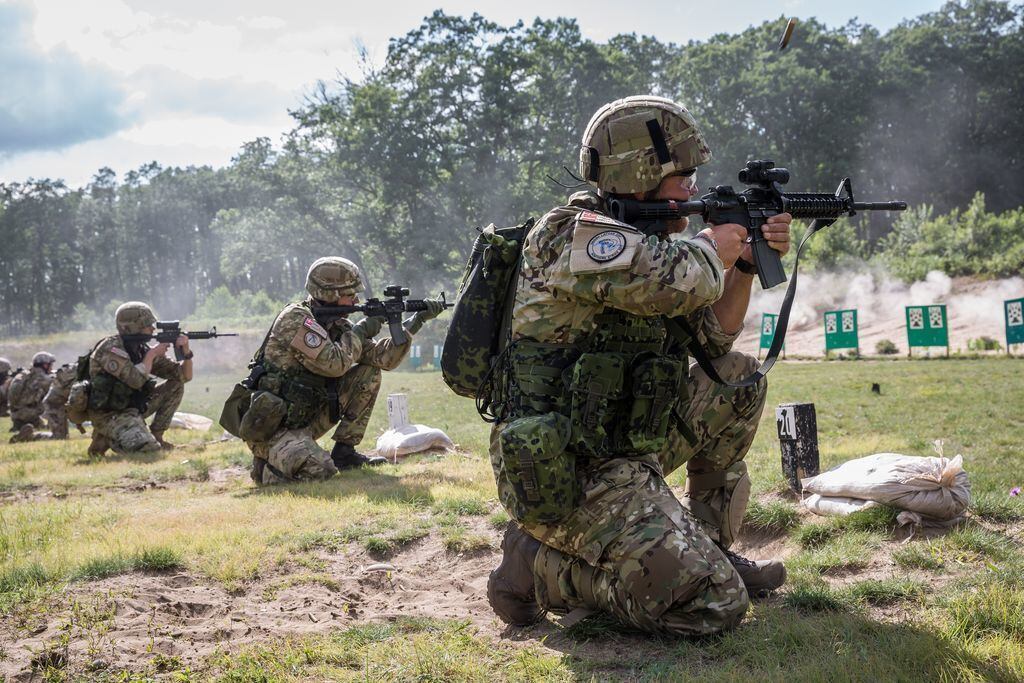BRUSSELS ― Germany needs to make a “sustained investment” in defense and stop “leaving the dirty work” to others, according to a new study.
The study, called “Jumping over its shadow,” was published Thursday and calls for Berlin to stop “ducking military responsibility.”
Its findings come despite the majority of German public favoring only a modest increase in defense spending rather than a substantial step change.
The study, conducted by Friends of Europe, a highly respected, Brussels-based think tank, says Germany, as Europe’s most powerful economy, has the “biggest potential” to contribute financially and give “critical momentum” to a European defense union, alongside France.
Its publication is timely as the newly re-elected German chancellor, Angela Merkel, continues coalition negotiations with the liberal-right Free Democrats and the anti-nuclear ecologist Greens, in which defense is likely to be a bone of contention.
The study, which drew on interviews with senior NATO officials, politicians and security experts, concedes there is “little enthusiasm” among the German public for a substantial increase in the country’s military spending from the current 1.2 percent of gross domestic product.
But it goes on to say that the German armed forces have been “hollowed out by two decades of attrition.”
Paul Taylor, who authored the study, states: “Planes, helicopters, armoured vehicles and ships are cannibalised to keep a limited number running. Despite a turnaround in the defence budget since 2016, fully equipping the Bundeswehr will take 10 to 15 years. The defence industries are in flux due in part to incomplete reforms of the procurement system.”
To make itself more “europafaehig” (fit to work in Europe), the study insists Germany must “jump over the dark shadow of its past” and develop a “proactive strategic culture.”
“It must make a sustained investment in defence after two decades of continuous cuts, and adapt its institutional set-up to make itself a more effective partner, better able to exercise shared leadership in security and defence.”
The study says that for historical reasons, Germany has pursued a policy of diplomatic and military restraint but has also “begun to take greater responsibility” for international security as its strategic environment has deteriorated.
“Germans are right to criticise Western interventions in Iraq and Libya as short-term military solutions that left a catastrophic aftermath, and to advocate a comprehensive approach to conflict prevention and resolution using all the tools of diplomacy, development and capacity building.
“But this cannot be a pretext for ducking military responsibility and leaving the dirty work to others.”
RELATED

‘Insane’ budget allocation
The next German government has three choices of where to put its resources: mostly with NATO, though this would be at the risk of “preparing to fight the last war”; mostly in a European Union defense initiative, which carries the risk of “under-delivering and having to accept fiscal transfers for defence”; or a combination of both.
Publication coincides with a separate Friends of Europe survey of German and international policymakers that found that Islamic terrorism at home and in the Middle East as well as cyberattacks were perceived as the main threats to Germany, ahead of Russia or challenges related to climate change and migration, although Eastern Europe and the Baltic Sea were seen as Germany’s areas of greatest strategic interest.
Respondents were evenly split between NATO and EU defense cooperation as the main priority for Berlin.
The survey said a clear majority favoured only a modest increase in defense spending rather than a substantial step change.
Angela Merkel has repeatedly reaffirmed her commitment to raise Germany’s defense spending toward 2 percent of GDP by 2024 — as NATO countries agreed in Wales at a 2014 summit.
Given that it would be nearly double the 1.2 percent of GDP, or $45 billion a year that Germany currently spends, many in the country have questioned the wisdom of investing 2 percent of its annual economic output on defense. German Foreign Minister Sigmar Gabriel recently said this would be “insane.”
RELATED

Further criticism comes from German Social Democrat leader Manuela Schwesig, who argued: “We don’t need rearmament, we don’t need to spend an additional €20 billion, [or U.S. $23.7 billion], a year on weapons. We want to spend that money instead on education and better equipment at our schools.”
Gero Neugebauer, a political scientist at Berlin’s Free University, agrees: “Germans are against military interventions abroad and most aren’t interested in more defense spending as long as so many school buildings are in a state of disrepair.”
No one at the Permanent Representation of Germany to the EU was available for comment.
Only four of the 29 NATO members have met the 2 percent GDP target, with the United States leading the way with 3.6 percent.
Though it is one of Europe’s most prosperous countries and its federal government produces annual budget surpluses, Germany ranks 17th behind countries such as Romania, Poland, Montenegro, Norway, Portugal and Croatia.
Martin Banks covered the European Union, NATO and affairs in Belgium for Defense News.








